A GUIDE TO OAKWOOD ELEMENTARY CAMPUS
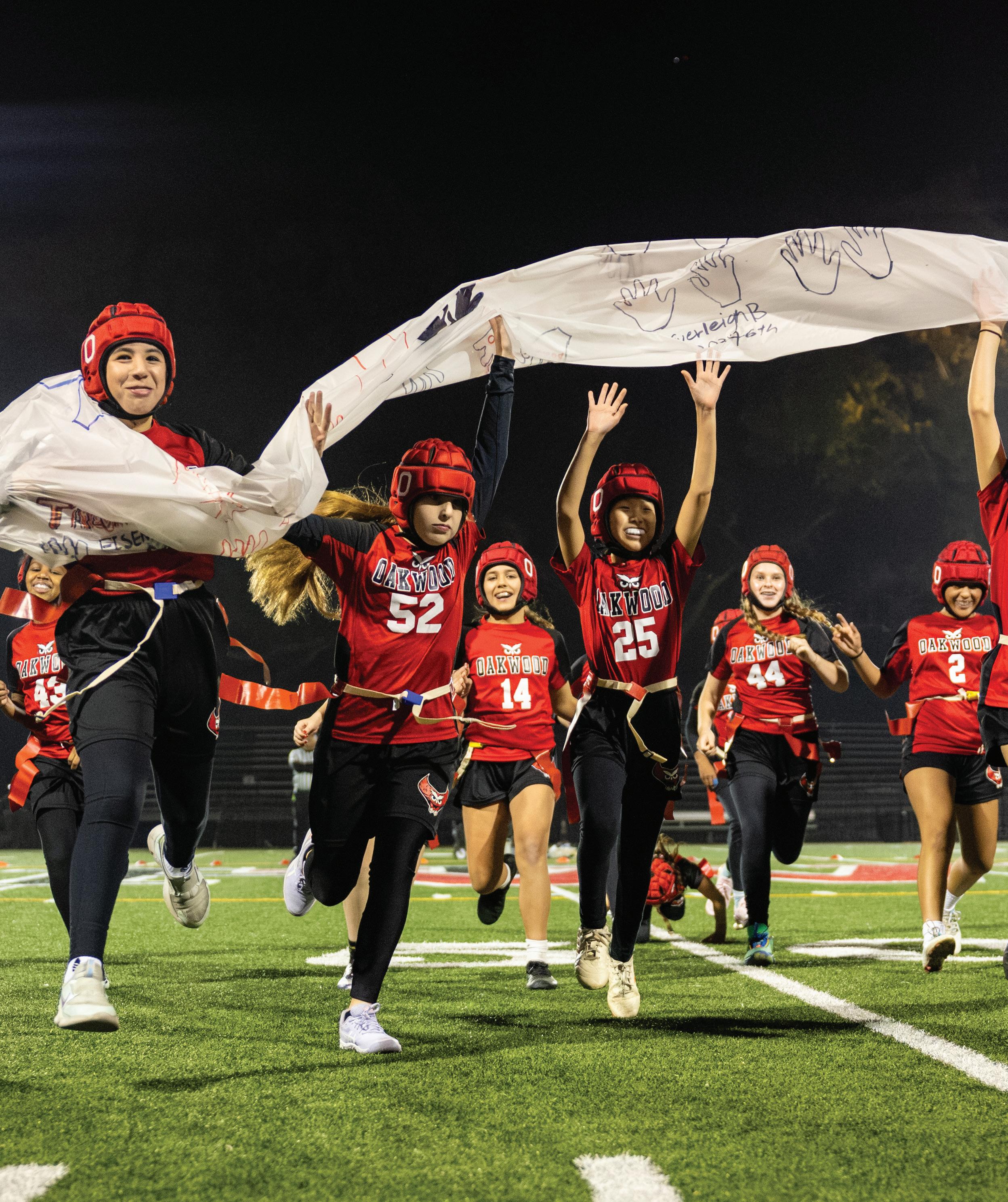




Welcome to the elementary campus, where an Oakwood education begins each morning with the familiar sounds of the courtyard bell. Enthusiasm and purposeful enterprise shape a daily experience deeply rooted in our Statement of Philosophy.
Beginning in kindergarten, students experience an engaging educational program that ignites their intellectual curiosity. Our curriculum and instruction promote relevance through realworld applications and inquiry-based learning; depth through critical thinking and problem-solving; responsibility through studies of human rights and social justice; creative expression through the arts and music; and community through athletics, performances, and myriad classroom activities. Through partnerships formed by teachers, administrators, and parents/ guardians, students develop as learners in the present to become well-informed, productive citizens of the future.
The focus on useful, applied knowledge is at the heart of our constructivist approach to education versus more traditional methods that often rely upon rote learning and teaching to a test. The ability of an Oakwood student to apply and further their own learning becomes an essential part of their identity that will distinguish and serve them for life.
EXPERIENTIAL


OAKWOOD SCHOOL WAS FOUNDED IN 1951 by parents who wanted to provide their children with an educational experience that was rich in the arts, sciences, and humanities and challenging to their creative, intellectual, and physical capacities. They wanted a learning community that would foster independence of thought, intellectual integrity, and sensitivity to the needs of others, and prepare students for participation in a democratic society.
Oakwood remains committed to the founders’ goals. We believe that a school environment should foster individual growth and an active communal life, should hold intellectual attainment in high regard, and should encourage young people to exercise increasing autonomy and responsibility–for one another, for the environment, and for the larger world.
We believe that school best prepares children for the future by focusing on the quality of their experiences in the present. We believe that teachers and learners should inspire one another, and that school must be rewarding in its own right. And we believe that young people’s feelings and thoughts should be accorded respect and dignity.
WE INTEND AN OAKWOOD EDUCATION:
to guide students toward mastery in their academic, artistic, and athletic pursuits. We want students to grapple meaningfully with ideas, to discover relationships among disciplines, and to become independent and moral thinkers. to spark passion. We want young people to become wholeheartedly immersed in their work. We believe that intelligence and imagination enrich each other, and that to involve a student passionately in learning is to involve the whole person.
to cultivate depth of character. We seek to nurture students’ empathy, imagination, and moral courage; to foster a sense of responsibility and humility, along with a habit of service; and to instill a lifelong commitment to social justice. We intend for the development of their intellect and character to be intertwined, so that their choices are guided by internal controls and sensitivity to the needs of others.
to help students gain self-knowledge. We want students to learn about their strengths and needs as learners. We seek to accommodate and appreciate the unique qualities of each young person and to provide multiple opportunities for students to succeed, to learn from mistakes, and to take risks for the sake of learning.
to foster a sense of community. We seek to create a vibrant public life in the school, where students learn to express themselves fluently and responsibly, and to consider differing perspectives respectfully. We believe that an environment most conducive to learning and growth is diverse and inclusive, and balances seriousness of purpose with a sense of play.
Finally, we recognize that the school can best achieve its aims when students’ experiences are predominantly positive and joyful, and where their relationships with teachers, and with one another are caring and trusting.
More than a statement of intent, our philosophy helps generate the richness, warmth, and vitality of day-to-day life at Oakwood, and the respect Oakwood has for its students. We consider childhood precious, and we take young people seriously. We believe that their feelings and thoughts should be accorded the dignity they warrant.
Adopted by the Board of Trustees, November 2, 2016
SCHOOL HOURS:
8:30 am–3:00 pm Monday-Friday
• Drop-off 8:00-8:30 am
• Pick-Up 3:00-3:20 pm
The library is open daily 8:15 am to 3:30 pm
After-school: 3:20-6:00 pm
FOUNDING DATES:
Elementary campus 1951
Secondary campus 1964
CAMPUSES:
Oakwood School is located on two campuses, a mile apart. The elementary (K–6) campus is located on Moorpark Avenue. The secondary campus, located on Magnolia Blvd., comprises our middle school (grades 7–8) and our high school (grades 9–12).
The K–12 structure at Oakwood allows students to benefit from a seamless academic journey where each stage builds intentionally on the one before it. Each campus is thoughtfully designed to support the developmental and academic needs of its specific grade levels, creating optimal environments for learning and growth.
When students transition to the secondary campus, their grade-level cohort doubles in size—offering a fresh start and the opportunity to grow, explore new interests, and expand their sense of self. With a broader range of academic courses, athletic programs, and extracurricular opportunities, students step into a dynamic environment that encourages them to stretch, thrive, and shape the next chapter of their Oakwood journey.
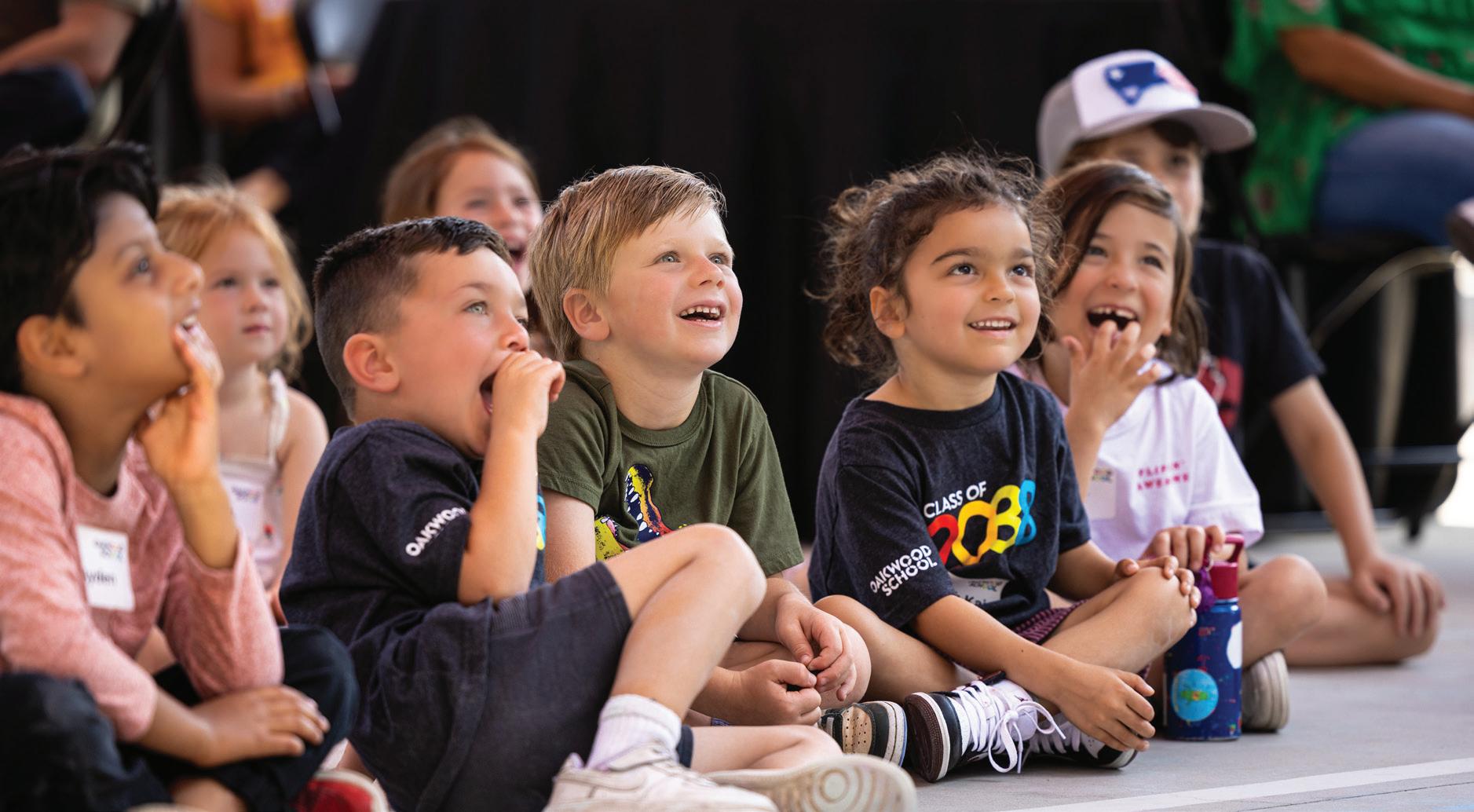
Head of School:
Jaime A. Dominguez
Assistant Heads of School:
John Gentile & Miriam Singer
Principal: Denise Ross
Assistant Principal: Kevin Golden
Elementary Campus Faculty-Student Ratio: 1:11
Teaching Faculty: 25 faculty members (including three learning specialists) and 21 teaching assistants
Faculty/Staff of Color: 47%
Average Faculty Tenure: 10 years
Faculty/Admin with Advanced Degrees: 58%
STUDENT BODY, GRADES K-6:
Total Enrollment: 318 students
Students of Color: 50%
Students Per Grade, K-6: approx. 44-50
Average Class Size: 22 students
Average Financial Assistance Award: $31,037
Students Receiving Financial Assistance: 21%
Active Alumni: 3,401
STUDENT BODY, GRADES 7-12:
Total Enrollment: 520 students
Students of Color: 51%
Students Per Grade, 7-12: approx. 80-95
Average Class Size: 16 students
Average Financial Assistance Award: $31,037
Students Receiving Financial Assistance: 21%
Active Alumni: 3,401

COMMUNITY ROOM
OUTDOOR BASKETBALL COURT & PLAYGROUND
SIXTH GRADE EAST & WEST SCIENCE

FIFTH GRADE EAST & WEST PRINCIPAL’S
SUPPORT SERVICES
PRINCIPAL’S OFFICE
WOODBRIDGE PARK
MAIN COURTYARD
KINDERGARTEN EAST & WEST
SCHOOL COUNSELOR
SECOND GRADE EAST & WEST
THIRD GRADE WEST
HEALTH OFFICE
KINDERGARTEN PLAYGROUND LANE
THIRD GRADE EAST
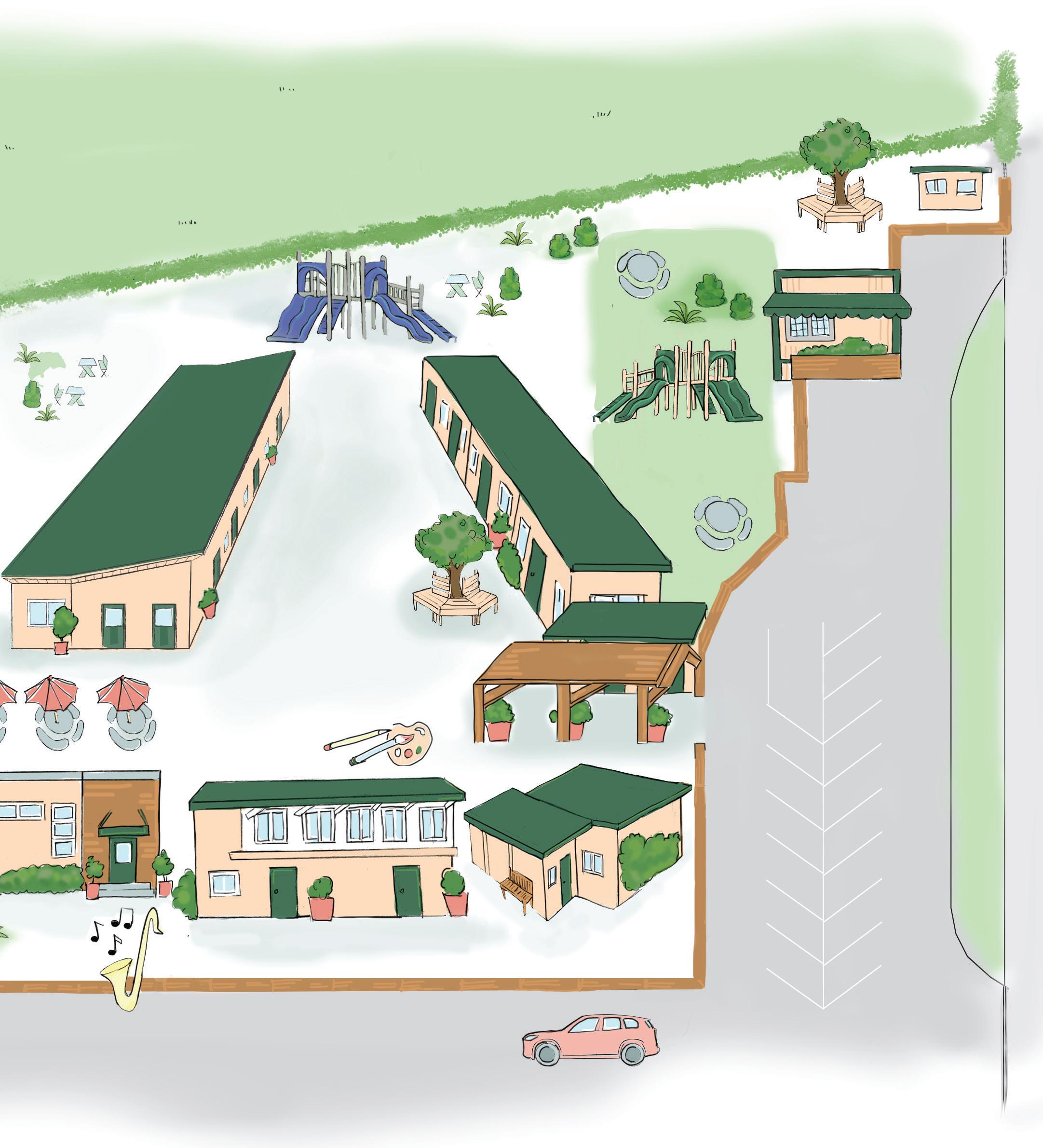
K-2 ART ROOM
SECURITY BOOTH
MUSIC STUDIO
GRADES 3-6 ARTS STUDIO
FIRST GRADE, NORTH & SOUTH
ADMISSION & FRONT OFFICE
In order to increase programming and maintain a strong academic curriculum, the Elementary Campus follows an 8-day cycle rather than a traditional Monday–Friday schedule. This rotating cycle ensures that no specialty classes—such as art, music, PE, or library—are missed due to holidays or other days off. Students attend school Monday through Friday, but instead of labeling days by the weekday, each school day is assigned a number from one to eight. This allows for consistent access to all subjects across the entire cycle. Core instruction in math and language
Quality teaching involves more than mastery of subject matter. It also involves an understanding of the unique and diverse characteristics of students as learners. Support Services personnel include a school counselor, a support services coordinator/ learning specialist, a math specialist, and a part-time reading specialist. They work alongside teachers and administrators to address the individual needs of students by helping teachers and students develop an understanding of the skills required by various classes.
Our Student Success team works closely to ensure students receive the academic, behavioral, and emotional support they need to thrive. Depending on each child’s needs, specialists may push into classrooms to provide support or enrichment, or students may be pulled out for more focused, targeted instruction. Whether a student is identified by faculty or family, our team thoughtfully tailors interventions and opportunities to help every child succeed.
arts takes place every day, providing a stable academic foundation alongside a rich variety of enrichment opportunities.
Oakwood offers an optional school meal program with freshly prepared lunches made in the secondary campus kitchen and delivered daily to the elementary campus. Students eat together in grade-level areas before enjoying free play and recess. Parents/guardians can select from a variety of meal options available to accommodate dietary needs. Kindergarten through 4th-grade and 5th/6th-grade students enjoy separate lunch periods.

Our full-time counselor at the elementary campus supports students’ social-emotional growth through direct engagement and guidance. The counselor partners with faculty, equipping them with tools and strategies to support students’ emotional wellbeing in the classroom, ensuring a nurturing and responsive learning environment.
At the elementary campus, the health and wellbeing of students are a top priority. We are proud to have a full-time, dedicated school nurse on staff who provides compassionate, professional care throughout the day. Whether attending to everyday bumps and bruises, managing chronic health conditions, or supporting wellness initiatives across campus, our nurse plays a vital role in fostering a safe, healthy environment where students can thrive.
Students in 4th through 6th grades can attend Math Lab to receive additional support, such as homework help, tutoring, or studying for an upcoming test. Parents/guardians or students sign up weekly for Math Lab.
Teachers in grades two and three provide additional math support for qualifying students. Students work on foundational skills such as building number sense, fact practice, and problem solving.
Overseen by the Dean of Curriculum and Instruction, the Writing Lab is an opportunity for students to hone their writing skills and receive additional support from upper elementary teachers. Students can use this time for class assignments as well as other creative and extension work. Parents/guardians sign up weekly.


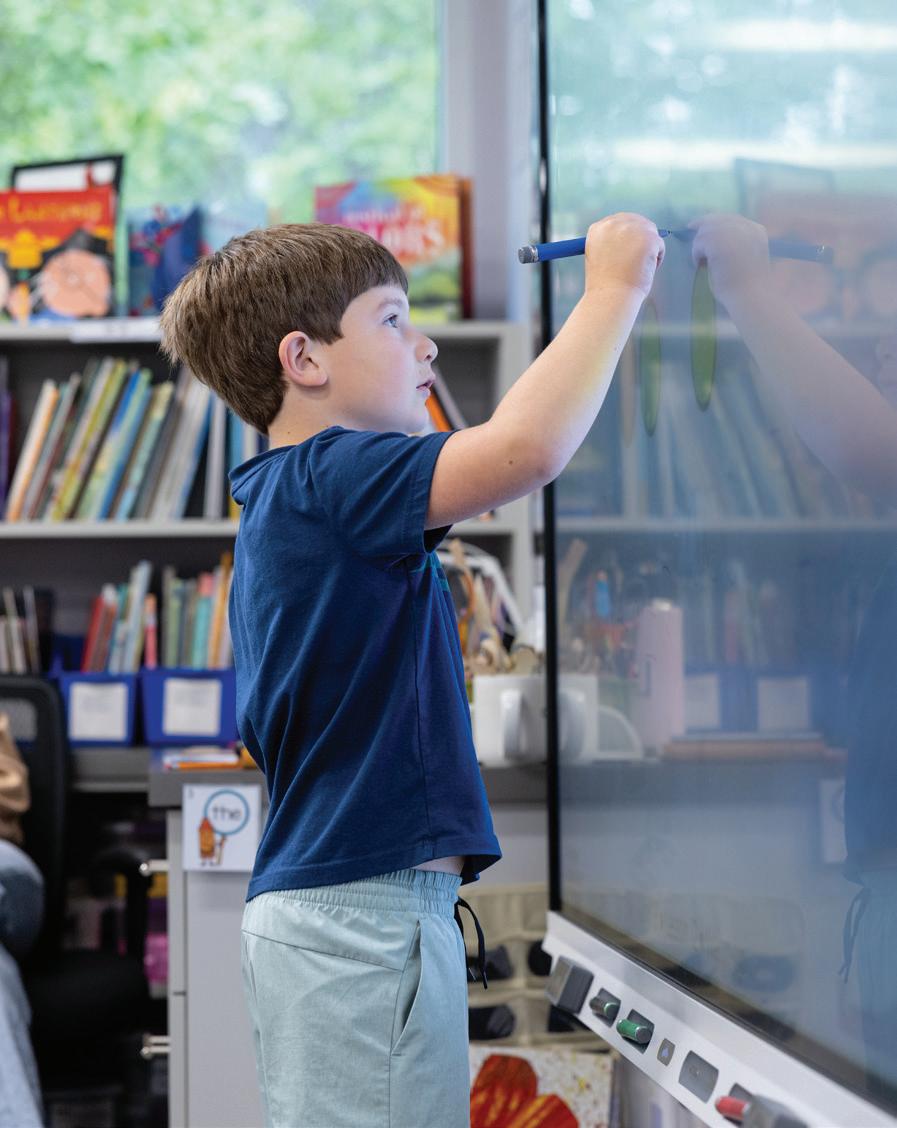
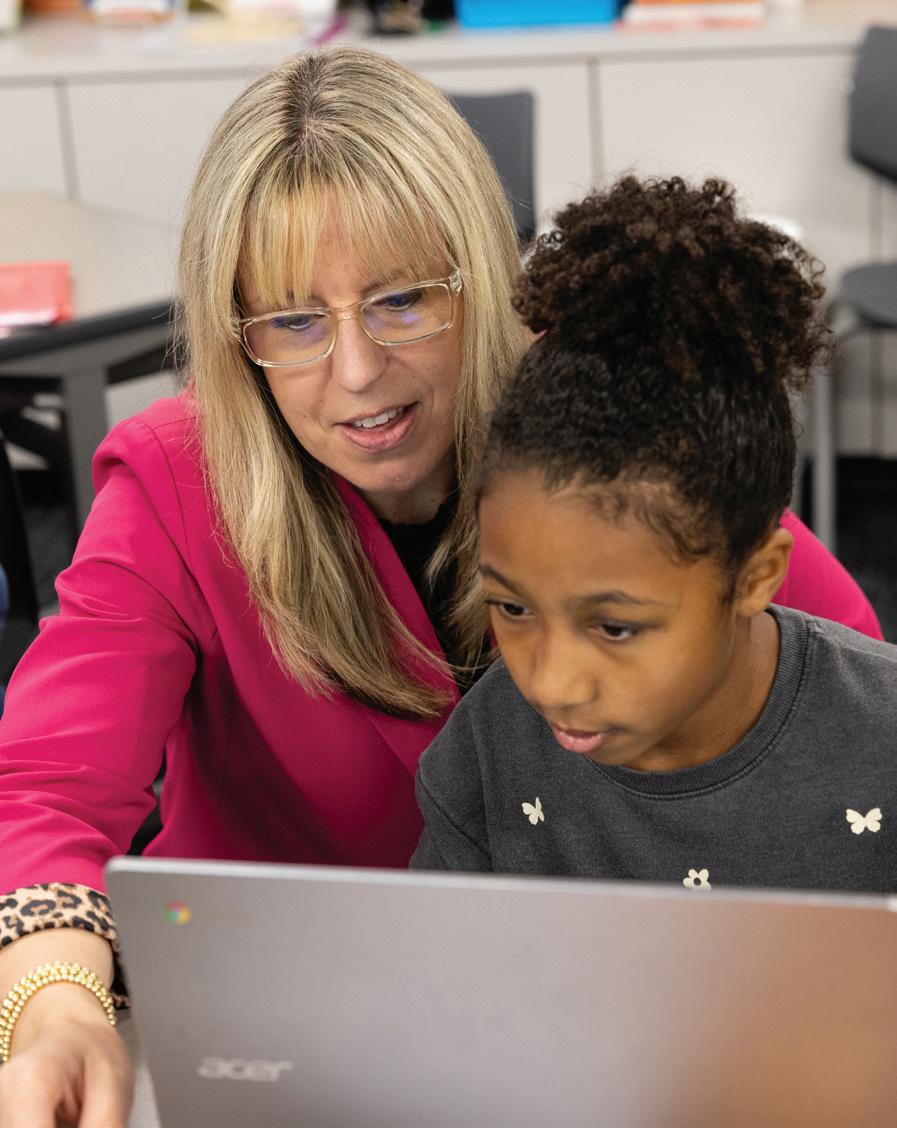


The language arts program encourages students to develop a lifelong appreciation for the power and beauty of the written word. Authentic, meaning-based experiences in conjunction with systematic skill instruction form the basis of our multidimensional approach to literacy. Our focus in reading provides students with a context for the study of literature and instruction in comprehension and cognitive strategies. Stories reflecting diversity build awareness and enable the analysis of social issues. Units comprising a variety of genres immerse students in writing processes that mirror the approach of professional authors. The Reading and Writing Workshop structure supports a gradual release of responsibility that promotes student ownership and independence in their construction of meaning.
The Reading and Writing Workshop creates a space for students to participate in authentic, meaning-based experiences in tandem with learning the formal features of language (phonics, spelling, and grammar). At the same time, this flexible organizational structure allows teachers to choose from a menu of teaching practices that continually alternate between teacher and
student control—the ultimate goal being student independence. This approach also provides many different grouping opportunities (whole class, small group, and individual conferences) and instruction that honors both the planned lesson and the spontaneous “teachable moment.” Our reading program emphasizes reading comprehension and developing fluency. Instruction is tailored to reading levels, focusing on decoding, using textual evidence, and discussing books. Students analyze books, explore story elements, and build independence, stamina, and joyful reading habits.
Connecting reading and writing instruction supports our belief that “readers learn about writing from reading while writers learn about reading from writing.” From grade to grade, the complexity of the texts, themes, and strategies grows and evolves in a developmentally appropriate manner, ensuring a confident progression of skills. The Writing Workshop philosophy fosters student development as a writer through explanation of process and direct feedback. This instructional model encourages students to develop their thinking and share their voice and ideas as part of a community of learners.
Kindergarten and 1st graders learn to read through differentiated guided reading groups tailored to each child’s instructional level and word study that supports reading and writing development. In 2nd and 3rd grade, students use language to learn, such as exploring ways authors can highlight social issues through literature or gaining knowledge through expository texts.
In 4th, 5th, and 6th grade, students experience curriculum and approaches that deepen their reading and writing skills through more sophisticated processes and subject matter. Instruction in these grades includes exploring texts that present multiple perspectives of complex historical moments and promote inferential thinking. Students engage in both small book groups as well as grade-level texts, and develop their speaking and listening abilities in conjunction with other critical skills in reading and writing.



Kindergarteners and 1st graders participate in Writing Workshop to learn the structures and routines of writers. Teachers use mini-lessons and conferences to teach both whole and small groups, as well as confer individually with students, supporting them where they are at. Together, the classroom will become a community of writers and storytellers. The goal is for students to connect reading and writing, as well as begin to develop ideas about authors, illustrators, and genres.
In 2nd grade and 3rd grade, students build on early writing skills and begin developing more advanced techniques. They write for different audiences and purposes, focusing on clearer organization and expression. The writing process includes drafting, revising, and improving grammar and mechanics. Students work closely with teachers and begin peer collaboration to grow as writers. Finally students develop and refine their writing practices as they work toward greater independence and fluency as writers.
In the upper elementary grades, the overall writing focus shifts to expanding volume, stamina, and speed across various genres. Students develop and refine their writing practices as they work toward greater independence and fluency as writers.
Writers in 4th through 6th grade focus on adding detail and description to their work, learning to revise for elaboration and adjust pacing in narratives. They write for external audiences, ensuring clarity for readers without background knowledge. As their skills grow, students set clear goals and work more independently within the writing workshop. Tools like graphic organizers, focused feedback, and peer partnerships support their progress, collaboration, and confidence as developing writers. The goal is for students to be proficient composing a variety of fiction and nonfiction work.
Beginning in kindergarten, the primary goal of the mathematics curriculum is to promote a rich, problem-based experience. The program allows students to formulate and solve problems, apply concepts in various situations, and make meaning for themselves. Our approach balances conceptual and procedural understanding through multiple models, manipulatives, and flexible thinking. We believe all students will learn and enjoy mathematics and recognize its value through these comprehensive learning experiences.
Math Olympiads are an optional national math competition program for grades fourth through sixth grade. Students practice during their lunch period and selected math classes.
GRADE
KINDERGARTEN
GRADE 1
GRADE 2
GRADE 3
GRADE 4
GRADE 5
GRADE 6

Counting to 100, number recognition, basic addition & subtraction, shapes, comparing size
Addition & subtraction to 20, place value to 120, telling time, simple data
Addition & subtraction to 100, place value to 1,000, intro to multiplication, money, measurement
Multiplication & division facts, basic fractions, area & perimeter, interpreting graphs
Multi-digit multiplication & division, fractions with like denominators, decimals, conversions
Fraction operations, decimal operations, volume, coordinate plane
Ratios, dividing fractions, negative numbers, expressions & equations, basic statistics
Students participate in exploration and scientific investigation using an inquiry-based, experiential approach. In the classroom, science units of study are taught through multimedia lessons. In our science center, a laboratory setting affords students hands-on opportunities to study various topics, from the physical properties of matter to the nature of human body cells. The school garden also provides a base for environmental studies, allowing children to learn and appreciate their role as caretakers of the earth. Field trips offer even more experiential learning opportunities that enhance classroom and science center instruction. Here are the highlights from the science curriculum by grade level :

GRADE
KINDERGARTEN
GRADE 1
KEY TOPICS
Five Senses, Matter, Weather/Seasons, Habitats, Life Cycles
Astronomy, Early Earth & Life, Ancient Oceans, Ice Age & Early Mammals
GRADE 2
GRADE 3
GRADE 4
GRADE 5
GRADE 6
Water, Air, Arthropods, Simple Machines
Sound, Light, Weather, Geology
Ecology (Ecosystems & Biodiversity), Earth Science, Magnets & Electricity, Astronomy
Force & Motion, Chemistry, Oceanography/Marine Biology
Biology, Natural Selection & Evolution, Genetics
Our social studies curriculum prepares students to become ethical, empathetic, and socially conscious members of a global society. Through engaging, inquiry-based learning, students explore identity, history, human rights, and social justice. Classroom experiences promote critical thinking and a deep understanding of their roles as change-makers in their communities and the world. Students also participate in discourse that requires respect for multiple perspectives.
GRADE 1
GRADE 2
GRADE 3
Identity, family, community, children’s rights
Personal history, identity and change, making a positive impact
Needs vs. wants, community study, local community service project
Los Angeles history & multiculturalism, indigenous peoples (Tongva, Tataviam)
GRADE 4
GRADE 5
GRADE 6
California history, climate & biodiversity, climate change research
U.S. history: colonial era to Reconstruction
Rights, responsibilities, and society; ancient civilizations through modern day

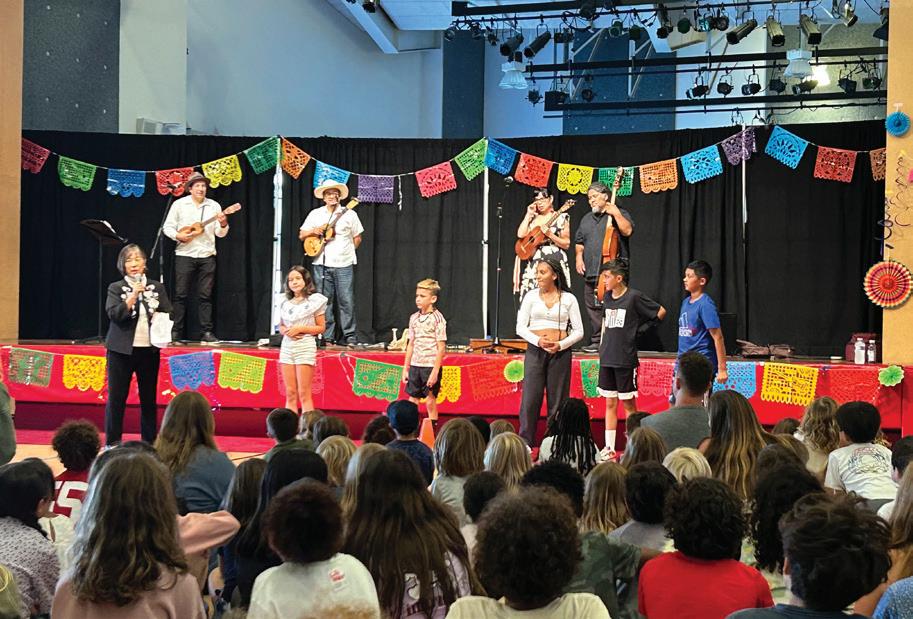
The Spanish program utilizes a multifaceted approach to language acquisition. Students in kindergarten through 6th grade receive instruction in the requisite skills (vocabulary, pronunciation, and grammar) that lead to the development of basic conversational, reading, and writing ability. Equal emphasis is placed on the history, culture, and geography of several Spanish-speaking countries, enabling students to gain an understanding of their uniqueness and diversity. Literature, art, music, field trips, and celebrations are among the experiences that add a rich texture to the curriculum.
Moving into 7th grade at the secondary campus, students have the option to continue Spanish or take French or Mandarin.
We believe in the transformative power of the performing arts. Our dynamic, interdisciplinary curriculum includes voice, instrumental music, dance, theater, musical literacy, music history, composition, and music production.
During the school day, students in kindergarten through 2nd grade focus on building strong foundational skills. Starting in 3rd grade, students choose from four performing arts electives each semester: chorus, dance, acting, or instrumental music. At this stage, they may also begin studying a string instrument and join the string orchestra. By 4th grade, opportunities
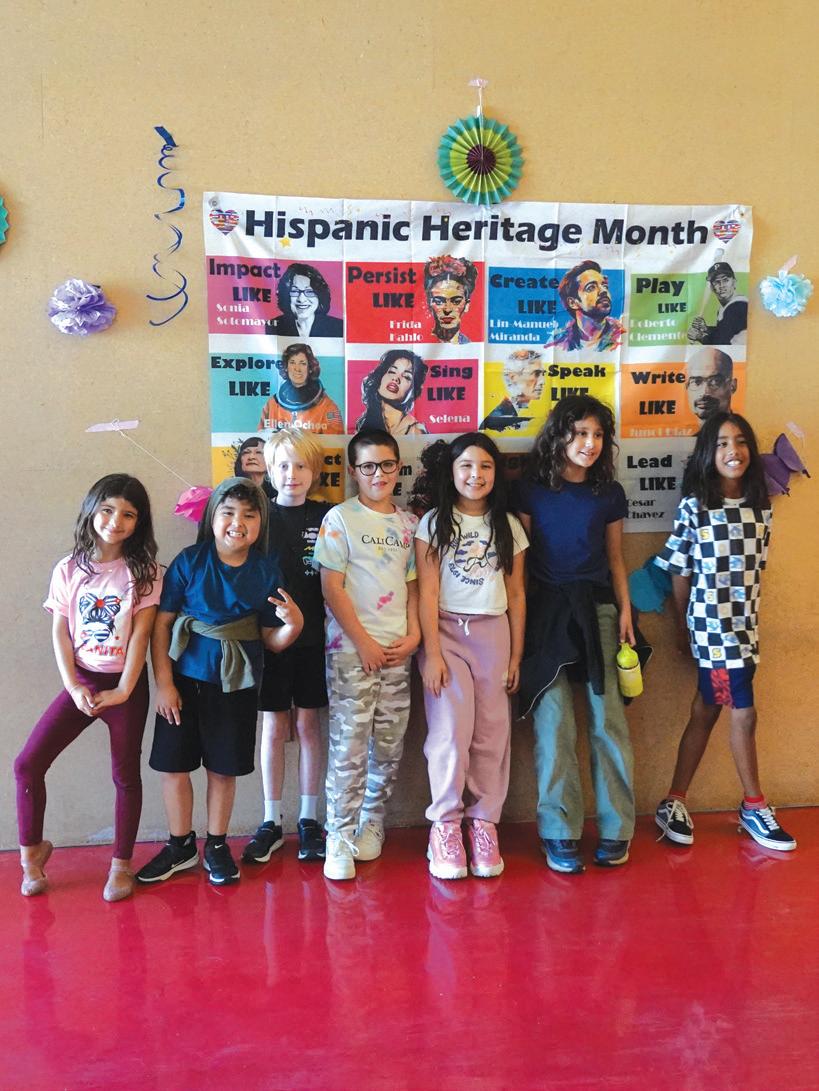
expand to include concert band, full orchestra, and jazz ensembles.
Our optional after-school programs offer enriching experiences in instrumental and vocal lessons, as well as classes in theater, chorus, dance, guitar, music production, composition, and instrumental ensembles.
Throughout the year, our students’ dedication and talent shine in numerous concerts and performances, celebrating the artistic achievements that define Oakwood’s vibrant spirit and commitment to excellence.

Lessons are provided at no additional charge.
• 3rd Grade Beginning String Lessons
• 4th Grade Continuing String Lessons
• 4th Grade Beginning Band Lessons
• 5th Grade Continuing Strings Lessons
• 5th Grade Continuing Band Lessons
• 5th Grade Ukulele Lessons
• 6th Grade Continuing Guitar Lessons
• 6th Grade Ukulele Lessons
• 6th Grade Continuing Strings Lessons
• 6th Grade Continuing Band Lessons
After-school program prices vary depending on the program.
• 3rd-4th Grade Junior Choraliers
• 3rd-4th Grade Oakwood Elementary Fall Musical
• 5th-6th Grade Oakwood Elementary Spring Musical
• 4th-6th Grade Hip Hop Dance & Spirit Squad
• 4th-6th Grade Pop Group (Vocal)
• 4th-6th Grade Beginning Guitar & Electric Bass
• 5th-6th Grade Music Production
• 5th & 6th Grades Pop/Rock Band
• 5th & 6th Grades Jazz Combo
• 3rd-6th Grade Practice Lab
• 3rd-6th Grade Supplemental Lessons
• 5th-6th Grade Theatre Tech Workshop
• 5th-6th Grade Acting Skills Workshop
• 5th-6th Grade Set and Prop Design Workshop
• 4th-6th Grade Strings Catch Up Workshop
• 5th-6th Grade Band Catch Up Workshop

The art curriculum focuses on skill-building and creative expression. In Oakwood’s two art studios, students are encouraged to share their ideas and discoveries as they work with diverse media styles and perspectives. Children create works through the introduction and exposure to art history and contemporary art. Interdisciplinary collaboration with teachers enhances the academic curriculum and brings to life concepts taught in the classroom.

Students learn and apply digital skills in the context of the overall curriculum. As they acquire technological fluency, students utilize the language of technology, enabling them to move from keyboarding to coding and generating new ideas and applications, while being effective and responsible digital citizens. Coding and
programming are explored in all years, and the program emphasizes project-based learning with digital tools. An overall focus on digital citizenship and fostering a positive tech and media balance helps students build self-regulation and agency in their use of tech tools in school and at home.
Students learn about digital literacy/citizenship, coding, & academic technology through the lens of problem solving.
DIGITAL LITERACY & CITIZENSHIP CODING
ACADEMIC TECHNOLOGY/ COMPUTER SCIENCE
Healthy Media Choices
Staying Safe Online
Discerning Consumers of Online Content
Tutorials
GRADE
KINDERGARTEN
GRADE 1
GRADE 2
GRADE 3
GRADE 4
GRADE 5
GRADE 6
Block Coding > Scratch Jr. > Scratch > code.org > Web-based programming
Robotics
Project Based Learning
FOCUS AREA
Coding, digital literacy, problem-solving
iPads/Chromebooks
Google Drive
Typing
Video Editing
Coding / programming, communicating with digital tools
Coding / programming, learning with digital tools, design thinking
Coding / programming, cloud computing and organizing work digitally, digital citizenship
Video editing, healthy media choices and balance
Computer science, typing, coding / programming
Coding / programing, digital citizenship, executive functioning skills with digital tools
Students are encouraged to enjoy athletics and value the benefits of physical activity as a way of life. All students participate in regular physical education classes. Children develop both physically and emotionally as they learn the values of cooperation and sportsmanship in individual and team sports.
Our program relies on skill-building beginning in kindergarten. Developing strong motor skills sets a solid foundation for instruction in the fundamentals of every sport. Practice in units of study including volleyball, basketball, football, baseball and softball, soccer, and track and field provides students the knowledge of gameplay as well as the readiness to compete in team play.
Additionally, students partake in lifestyle games including badminton, pickleball, and table tennis.
Oakwood competes in the San Fernando Valley Private School League against schools in greater Los Angeles including The Buckley School, Campbell Hall, Curtis, JohnThomas Dye, Laurence, Sierra Canyon, and Viewpoint. Here are the offerings for athletics at the Elementary Campus.



Beginning in 7th grade, students can choose from more sports, such as baseball, softball, track, cross country, fencing, and tennis.
Oakwood qualifies for playoff competition annually. Recent accomplishments include undefeated seasons for our flag football teams and league
championships in boys and girls basketball. Every coach at Oakwood is a teacher, who embodies the Oakwood philosophy with an emphasis on skill development, teamwork, fair play, and positivity.
98 %
5TH GRADE BOYS FLAG FOOTBALL UNDEFEATED CHAMPIONS 2024-2025
6TH GRADE BOYS SOCCER UNDEFEATED CHAMPIONS 2024-2025
OF 4TH—6TH GRADE STUDENTS PARTICIPATE IN INTERSCHOLASTIC SPORTS
6TH GRADE GIRLS BASKETBALL (C) CHAMPIONS 2024-2025
6TH GRADE GIRLS VOLLEYBALL (A,B) PLAYOFF FINALISTS 2024-2025
6TH GRADE BOYS VOLLEYBALL (A) CHAMPIONS 2024-2025
6TH GRADE BOYS VOLLEYBALL (B) CHAMPIONS RUNNERS-UP 2024-2025
6TH GRADE BOYS BASKETBALL CHAMPIONSHIP FINALISTS 2023-2024
5TH AND 6TH GRADE FLAG FOOTBALL UNDEFEATED CHAMPIONS 2022-2023


ACADEMIC CONTINUITY
Our K–12 curriculum is intentionally designed to build skills year after year, ensuring students are fully prepared for each academic stage. Consistent communication between teachers across grades prevents learning gaps and supports student success.
From kindergarten onward, students engage with concepts of identity, empathy, and social justice. Early lessons in racial literacy and diverse perspectives lay the groundwork for deeper studies of immigration, race, and equity. Our curriculum empowers students to think critically, challenge assumptions, and appreciate multiple points of view.
Younger students naturally form connections with older peers who serve as mentors in academics, arts, and athletics. These relationships ease transitions between divisions and foster a strong
sense of belonging. Families also benefit from a connected community that grows together.
Oakwood’s K–12 program spans two campuses just one mile apart. The elementary campus offers a developmentally focused experience for grades K–6. Upon entering 7th grade, students move to the secondary campus, where new peers, faculty, and opportunities await with excitement.
There’s no need to re-apply, test, or interview when moving to the next division. This stressfree transition allows students to stay engaged in learning and fully enjoy their school experience.
With time and continuity, Oakwood students are truly known. Our long-term relationships support every child’s academic, emotional, and character growth in a community where they feel valued and supported.
At Oakwood, 5th and 6th grades are a bridge to middle school, providing students with the academic, social, and emotional support to succeed on their educational journey.
Our departmentalization model offers unique benefits as humanities, math, and science take center stage. Students are grouped into sections, allowing them to move through classes together and collaborate with peers. Students receive continuous science and math instruction from one teacher over two years, fostering solid bonds and academic confidence. With school-provided laptops and lockers, students build developmentally appropriate independence, preparing them for the challenges and opportunities that lie ahead.
As advisors, faculty, staff, and administrators mentor students through their 5th and 6th grade years, helping them build essential social-emotional skills to navigate the challenges of pre-adolescence. Lessons on emotional intelligence and restorative circles inform our advisory curriculum. In small groups of 10-12, students engage in peer relationship-building activities while strengthening their own competencies in self-reliance and resilience. Students in both grades participate in Advisory Field Day to begin and end the year.
Affinity & alliance groups provide space for students to explore and celebrate their identities. Whether it’s the Students of Color affinity group, Jewish student affinity group, or Rainbow Alliance group, students can connect with peers who share similar backgrounds and experiences. Led
by faculty members who can speak from an “I” perspective, these optional monthly meetings foster a sense of belonging and support.
In 6th grade, students embrace leadership roles to shape their school community. From mentoring younger students in our kindergarten buddy program to representing Oakwood at events such as prospective parent mornings and community celebrations, 6th-graders develop responsibility, confidence, and empathy, preparing them for future success as leaders in middle school and beyond.


Through experiential learning, we seize opportunities to inhabit the spaces between traditional and progressive pedagogy, and we increase the permeability between the classroom and the world around us
The Explorations program cultivates curiosity, imagination, and creativity. Rooted in design thinking, immersive, hands-on, and interdisciplinary learning integrates science, technology, engineering, art, and math through real-life problem-solving tasks. Students are encouraged to pursue their passions and are empowered to create, invent, and effect change. In 2026, the Explorations program will transition into the newly constructed Da Vinci Lab, a new space that will continue to elevate students’ experiential learning.
Inspired by Leonardo da Vinci, the Da Vinci Lab will be a vital component of the elementary campus educational program that embodies Oakwood’s core values, operationalizes the school’s mission, and embraces interdisciplinary learning. The Lab’s student-centered, hands-on experiences will endeavor to spark passion, instill a joy for learning, and inspire creativity, problemsolving, and innovation. Student inquiries, explorations, and discoveries about topics with personal and real-life relevance will develop independent and moral thinkers in “preparation for participation in a democratic society” (Statement of Philosophy, 2016).
Each grade level takes numerous local field trips that bring their curriculum to life. Some examples may include La Brea Tar Pits, Aquarium of the Pacific, Sepulveda Basin, Olvera Street, and the Cottonwood Urban Farm.



Our 4th graders study California history and culminate their learning in a daylong trip to Sacramento.
In addition to day trips, 5th and 6th graders embark on overnight trips.
• 5th Grade: Catalina Island (two nights)
• 6th Grade: San Diego (two nights)
Oakwood School is located right next to Woodbridge Park, providing students with daily access to its natural beauty. The park serves as an extension of our campus, offering opportunities for outdoor learning, creative expression, and play. Whether it’s recess, flag football or soccer practice, nature walks, or sketching trees for art class, students benefit from time spent in this vibrant, open-air setting outside of Oakwood.
Students in grades one through six have the exciting opportunity to showcase their learning through special culminating events held throughout the school year. These events highlight students’ growth and creativity, with each grade presenting a unique experience, such as the 1st grade Earth Gallery, the 2nd grade Arthropod Cabaret, and the memorable 6th grade Graduation. Through engaging performances and carefully curated classroom artifacts from all subject areas, these celebrations allow students to share their hard work with families and the school community.
At Oakwood, building a strong sense of community is at the heart of the student experience. Once each cycle, the entire elementary campus comes together in the gym for Community Time—a joyful gathering that includes everything from talent shows and pep rallies to musical performances, heritage month assemblies, and the beloved tradition of singing, “We’re All Together Again.”


Oakwood School continuously strives to create a trusting, respectful, and inclusive educational environment, inside and outside the classroom, where students feel confident to express and develop their own voice, values, and passions; where students gain the skills and knowledge to critically explore and assess their own and others’ assumptions and biases in order to reach more complex, more nuanced conclusions; where students understand problems and solutions from multiple points of view; and where students can form authentic, meaningful, and rich relationships across areas of difference. With the guidance of Oakwood’s office for Community Engagement and Belonging, our goal is to connect, empower, and support community members, as well as promote the multifaceted and diverse cultures within and outside of Oakwood.
AFFINITY GROUPS
The term affinity group is used as a bringing together of people who have an identifier in common, e.g. race, gender identity, sexual orientation, religious identity, family structure etc. Affinity groups are for individuals who identify as members of the group and can speak to the experience of being a member of the group from the “I” perspective.
Affinity groups allow for:
• Creating an opportunity for a critical mass experience for historically underrepresented/ marginalized groups
• Providing a safe environment where people who share an identity can come together for building community, fellowship, and empowerment
• Identifying and discussing issues related to identity development, bias, and systemic oppression
• Building resilience and sharing successes
• Promoting ideas for action

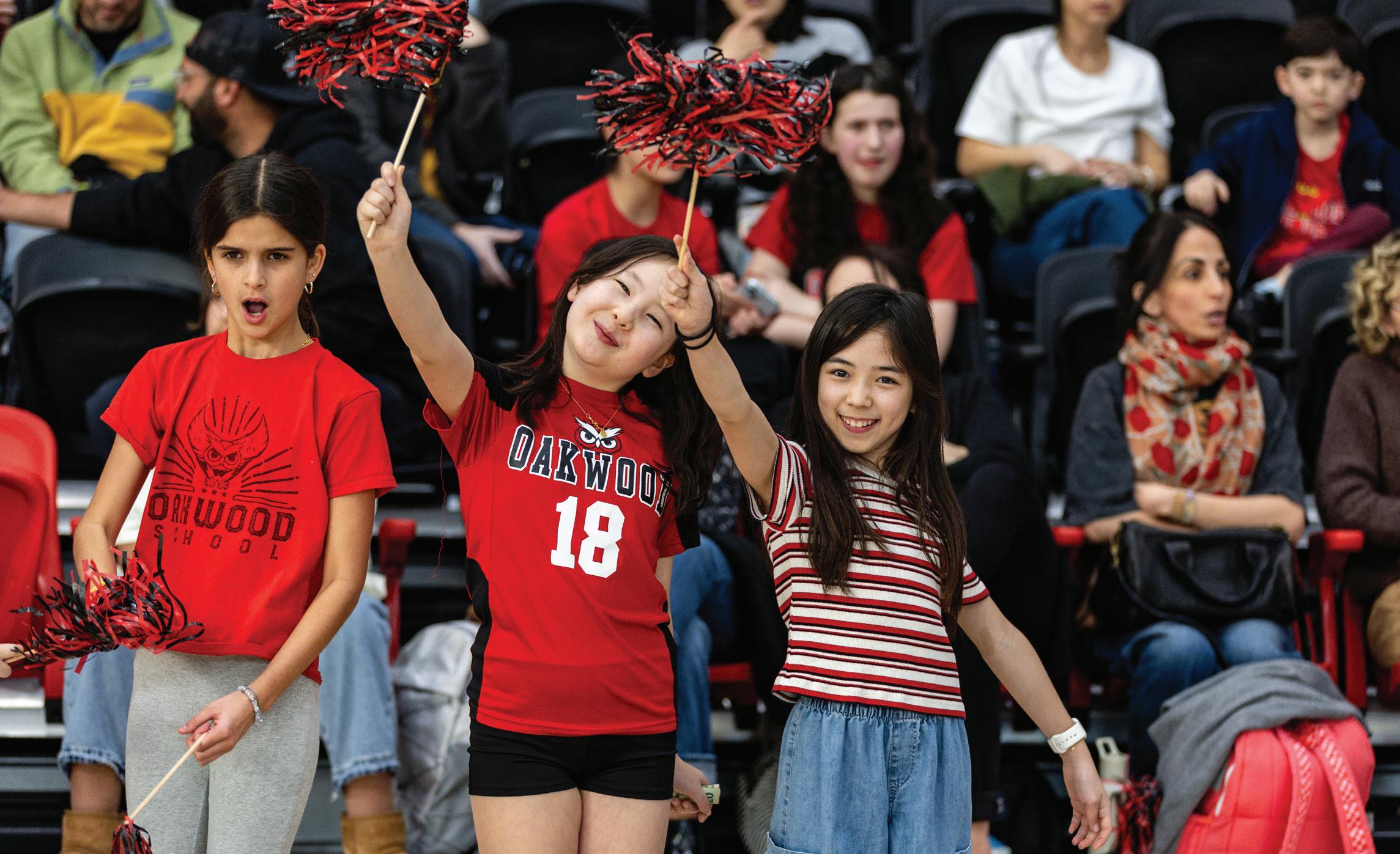
• Preparing for authentic and honest crosscultural conversation and collaboration with other affinity groups
Students will have more opportunities for affinity groups at the secondary campus. However, we believe it is vital that our 5th and 6th-grade students have the opportunity to explore and grow their understanding of their identities through positive, research-based, skill building, and community oriented curriculum and experiences. Through trained facilitators, students are provided mission-aligned spaces that foster connection, relationships, and positive social engagement. Affinity groups at the elementary campus are:
• Jewish Affinity Group
• Students of Color Group
The term alliance group is used as a bringing together of people who have common commitments to an identifier group, e.g. race, gender identity, sexual orientation, religious identity, family structure, etc. Alliance groups are for individuals who identify as members of the group and/or as people who support and stand in solidarity with that group.
Alliance groups at the elementary campus are:
• White Allies Student Group
• Rainbow Alliance
Throughout the year, Oakwood students take part in all-school Heritage Month Assemblies. These programs are produced in partnership with parent/guardian affinity and alliance group members who identify as members of specific cultural groups, as well as allies. We want students and families to bring their authentic selves to school and be celebrated.
At Oakwood, partnership between families and the school is a long-standing tradition that enriches every aspect of our community. Parents and guardians contribute in countless ways— volunteering their time, leading events, and supporting essential fundraising efforts like the Annual Fund and Oakwood Live, our annual special event supporting financial assistance. Whether through time, talent, or treasure, every family’s involvement helps sustain the warmth, excellence, and opportunity that define the Oakwood experience.
• Kindergarten Morning Meeting (Fridays)
• Parent/Guardian Coffee in the Courtyard (Fridays)
• Fall Picnic
• Bookwood
• Halloween
• PGO-DEIB
• P/G DEIB Ambassador
• Affinity/Alliance Group Leader
• Heritage Celebration Leader
• Room Parent/Guardian
• Popcorn Fridays
• Admission Committee
• Advancement - Annual Fund Class Captain
• Advancement - Special Event Committee
• Advancement - Financial Assistance
• Athletics Booster
• Care Committee
• Community Engagement
• Faculty/Staff Appreciation & Hospitality
• Leadership
• Merch
• Party Book
• Spirit Night
At Oakwood, the school day does not have to end at 3pm. Our robust after-school program offers families flexible options that support both care and enrichment. Students can enjoy playing with peers, take part in performing arts through Oakwood Elementary Performing Arts (OEPA), join exciting enrichment classes like fencing, debate, jewelry-making, or receive academic support in math lab. Whether exploring new interests or getting homework help, there’s something for every child after school. Costs vary depending on the programming.
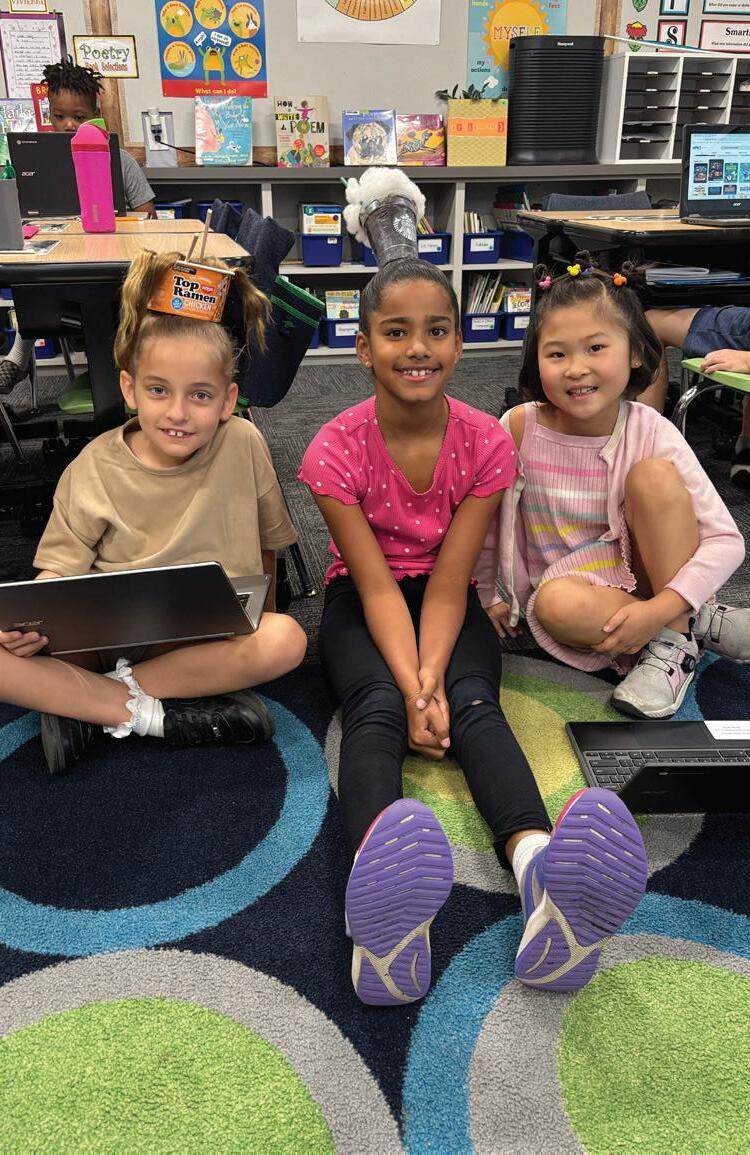
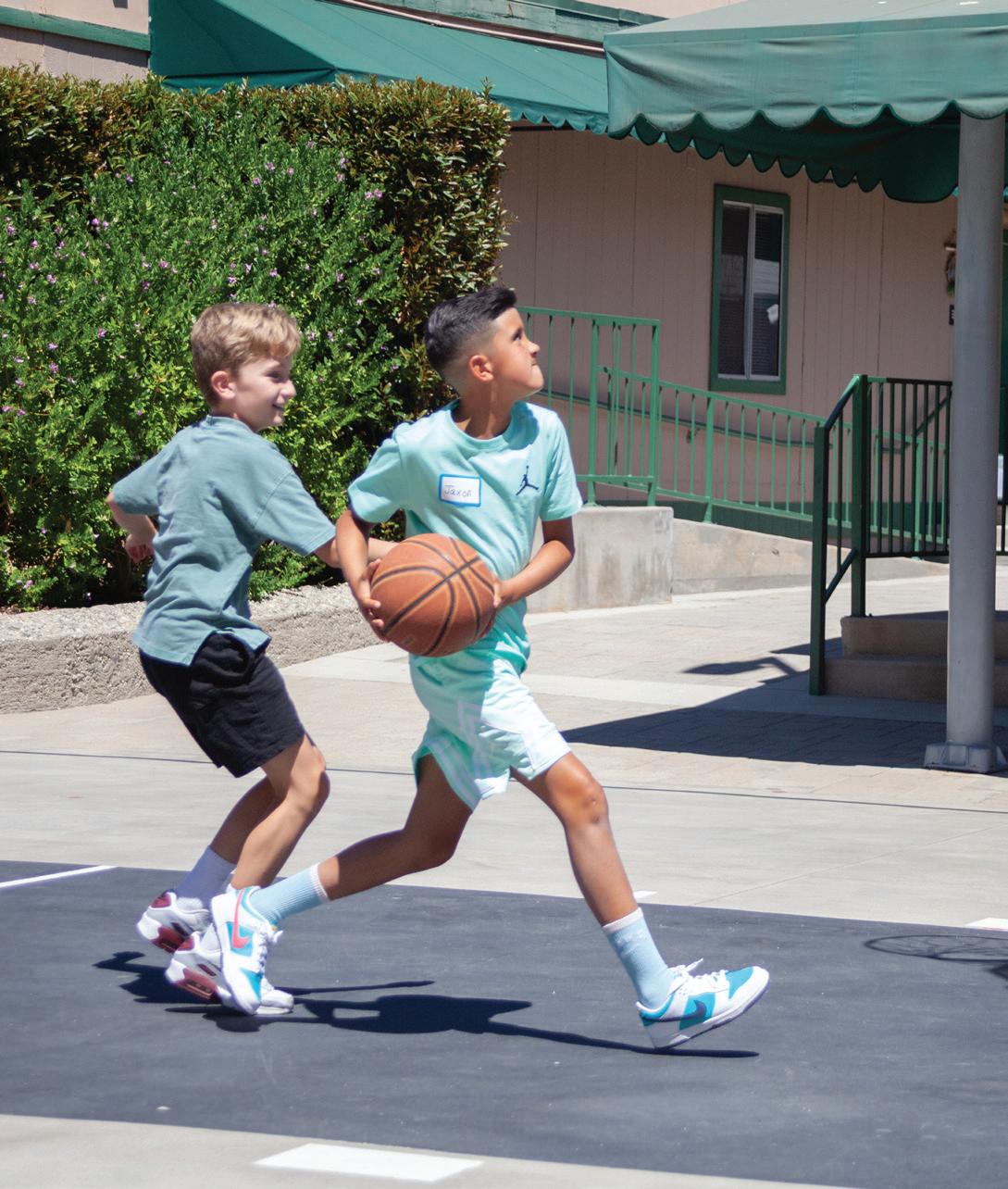
At Oakwood, in the classroom, technology isn’t used for its own sake. We prioritize learning first—integrating technology only when it meaningfully enhances student engagement, creativity, differentiation, and understanding. Our thoughtful, developmentally appropriate approach ensures students build essential digital skills while staying grounded in human connection and curiosity.
KINDERGARTEN
GRADES 1–4
iPads used for early learning exploration and creativity
Classroom Chromebook Sets: Shared devices integrated into small-group and project work
GRADES 5–6
GRADES 7–8
GRADES 9–12
1:1 Chromebook Program: Each student is assigned a personal Chromebook for use during the school year
Middle School 1:1 Laptop Program: Students receive a school-managed MacBook Air for daily use at school and home
Bring Your Own Laptop (BYOL): Students bring their own laptops that meet school tech requirements
MIDDLE & HIGH SCHOOL DEVICE PROGRAMS
Middle School 1:1 Laptop Program
• Launched in 2024–25, this program provides all 7th and 8th grade students with a school-managed MacBook Air laptops, supported by Oakwood’s Tech Department. Each year, the program will expand to include one additional grade, with the goal of serving all students in grades 7–12 by 2028.
High School BYOL Program
• Students in grades 9–12 currently bring their own laptops to campus. Teachers design their courses with the assumption that all students have access to a personal device.
At Oakwood School, we are committed to fostering a healthy relationship with technology. Our phone policy reflects careful research, community dialogue, and a commitment to balance and well-being. We prioritize face-to-face connection, focused learning, and time away from screens.
Elementary School: K-6
• Phones and smartwatches are not permitted on campus for students in Kindergarten through 6th grade.
Middle School: Grades 7–8
• Oakwood is a phone-free campus for Middle School students.
• Students who bring a phone must check it in with the Middle School Dean upon arrival.
• Phones can be retrieved from the Dean after school ends.
• Smartwatches may not be used during the school day.
High School: Grades 9-12
• High School students may carry their phones throughout the day.
• Use is only permitted before school, during lunch, and after school.
• If a student is seen using a phone outside of these times, the phone will be confiscated and returned by the Dean after school.
Oakwood School is committed to reducing our impact on both the environment and our neighbors. We therefore encourage families to take advantage of our bus service to help us achieve these goals.
We are offering four bus routes for the school year serving Hancock Park/Beverly Hills, The West Valley, Pasadena/Glendale/Los Feliz, and Culver City. Riders have the option of registering for one-way or round-trip routes, with unlimited
Oakwood’s phone policy is the result of thoughtful reflection, family and student feedback, and alignment with our school values. We aim to nurture socially engaged, wellbalanced students with healthy digital habits and strong interpersonal connections.
rides per week. We also offer day passes, based on availability. Financial assistance is available for qualifying families.
All buses are equipped with GPS, which allows parents to track their child's bus in real time through an app called SafeStop.
In addition, Oakwood is conveniently located by the 170 freeway and multiple Metro rail and bus lines.

The safety of our students, faculty, and staff is our top priority at Oakwood. Led by a retired FBI Special Agent and SWAT Tactical Operator, our security program is proactive, comprehensive, and constantly evolving.
We have 8 full-time Oakwood Safety Officers, supported by 12–14 contract security guards. Our campus is monitored by 90+ surveillance cameras focused on access points and potential vulnerabilities, with live feeds reviewed throughout the day.
Access is tightly controlled through staffed front and back gates during school hours, and all visitors are screened before entry. With detailed action plans and layered safety measures in place, we are committed to maintaining a secure and welcoming environment for our community.

For questions about admission to Oakwood School, email admission@oakwoodschool.org or call 818.732.3502.


instagram.com/oakwoodstories facebook.com/oakwoodschoolstories
As of 07.11.25
